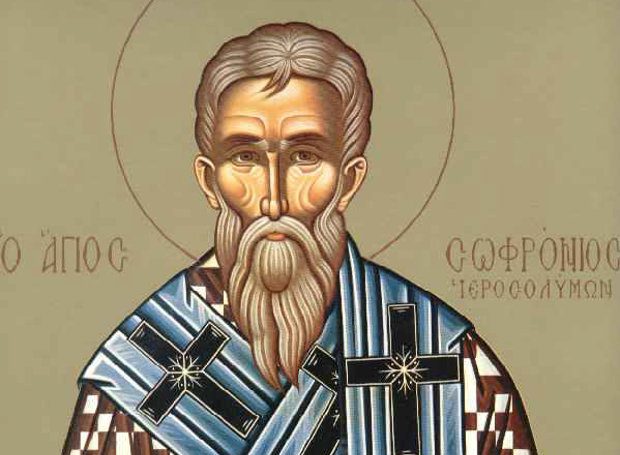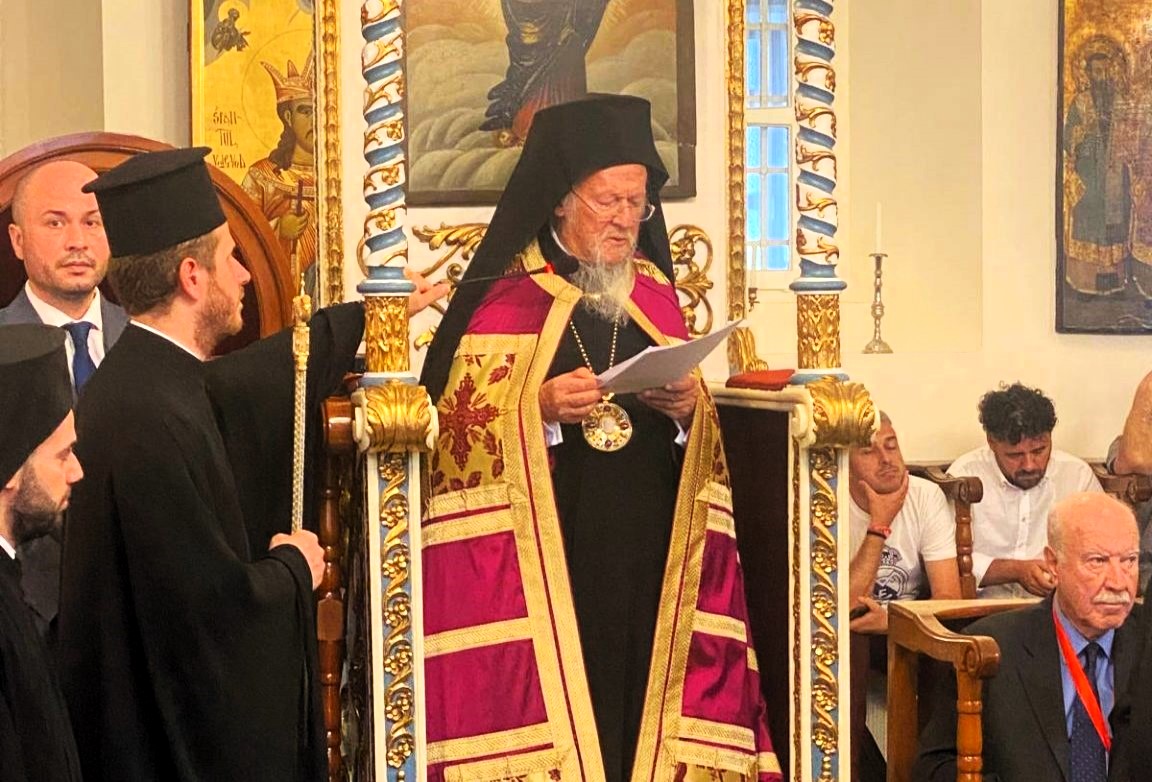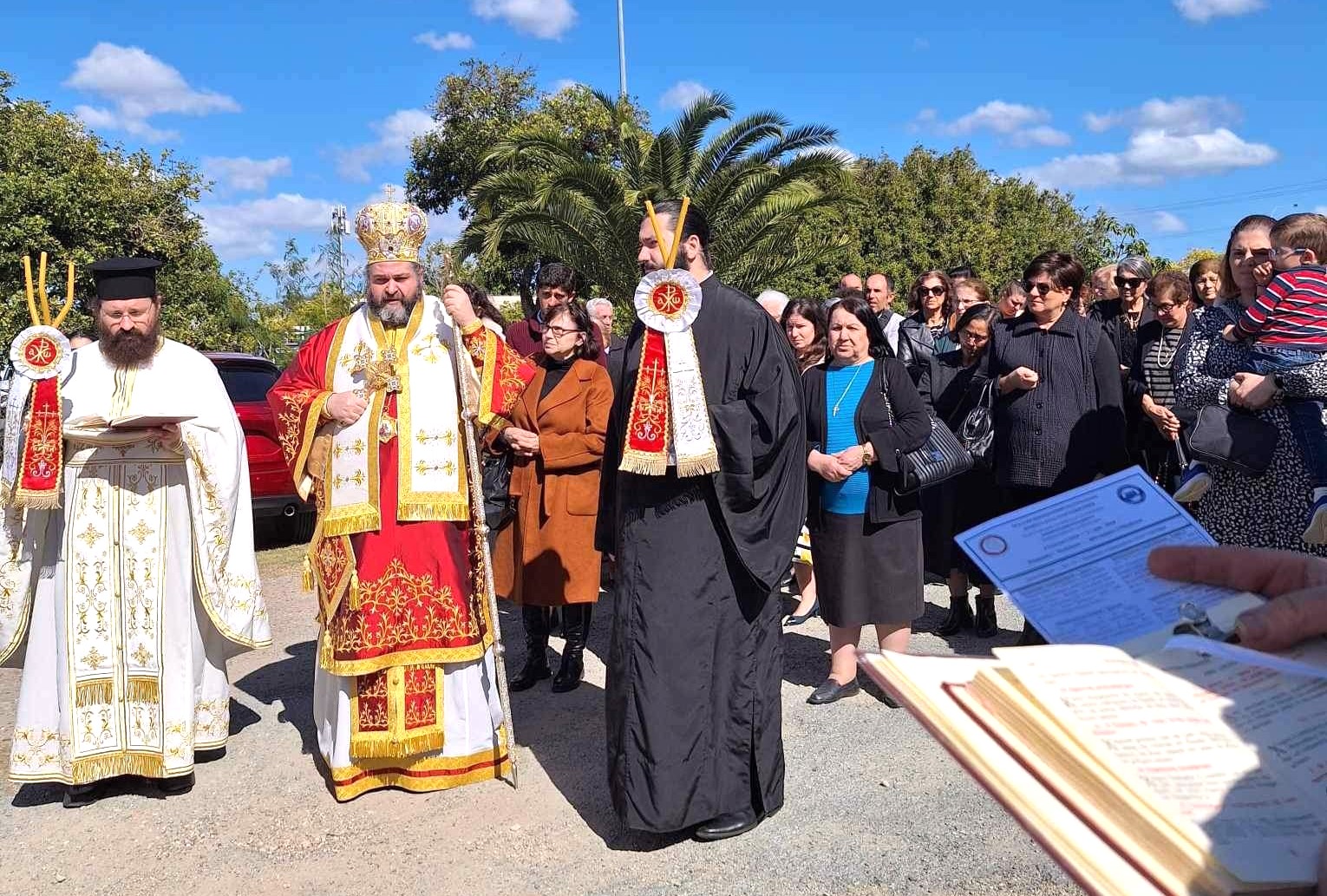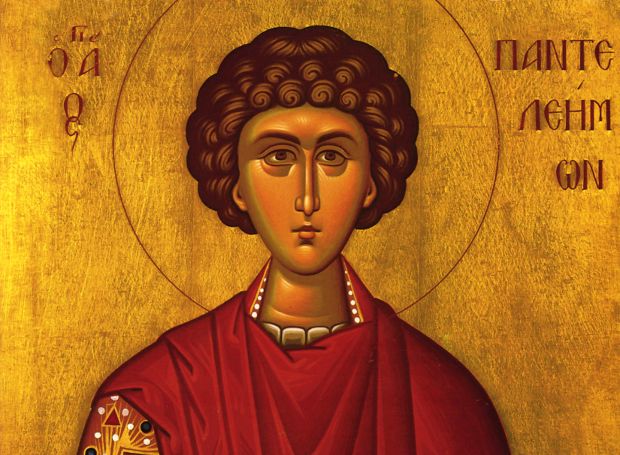Saint Sophronius, Patriarch of Jerusalem (11 March)


Saint Sophronius, Patriarch of Jerusalem, was born in Damascus around 560. From his youth he was distinguished for his piety and his love for classical studies. He was especially proficient in philosophy, and so he was known as Sophronius the Wise. The future hierarch, however, sought the true philosophy of monasticism, and conversations with the desert-dwellers.
He arrived in Jerusalem at the monastery of Saint Theodosius, and there he became close with the hieromonk John Moschus, becoming his spiritual son and submitting himself to him in obedience. They visited several monasteries, writing down the lives and spiritual wisdom of the ascetics they met. From these notes emerged their renowned book, the LEIMONARION or SPIRITUAL MEADOW, which was highly esteemed at the Seventh Ecumenical Council.
To save themselves from the devastating incursions of the Persians, Saints John and Sophronius left Palestine and went to Antioch, and from there they went to Egypt. In Egypt, Saint Sophronius became seriously ill. During this time he decided to become a monk and was tonsured by Saint John Moschus.
After Saint Sophronius recovered his health, they both decided to remain in Alexandria. There they were received by the holy Patriarch John the Merciful (November 12), to whom they rendered great aid in the struggle against the Monophysite heresy. At Alexandria Saint Sophronius had an affliction of the eyes, and he turned with prayer and faith to the holy Unmercenaries Cyrus and John (January 31), and he received healing in a church named for them. In gratitude, Saint Sophronius then wrote the Lives of these holy Unmercenaries.
When the barbarians began to threaten Alexandria, Patriarch John, accompanied by Saints Sophronius and John Moschus, set out for Constantinople, but he died along the way. Saints John Moschus and Sophronius then set out for Rome with eighteen other monks. Saint John Moschus died at Rome. His body was taken to Jerusalem by Saint Sophronius and buried at the monastery of Saint Theodosius.
In the year 628, Patriarch Zacharias of Jerusalem (609-633) returned from his captivity in Persia. After his death, the patriarchal throne was occupied for two years by Saint Modestus (December 18). After the death of Saint Modestus, Saint Sophronius was chosen Patriarch. Saint Sophronius toiled much for the welfare of the Jerusalem Church as its primate (634-644).
Toward the end of his life, Saint Sophronius and his flock lived through a two year siege of Jerusalem by the Moslems. Worn down by hunger, the Christians finally agreed to open the city gates, on the condition that the enemy spare the holy places. But this condition was not fulfilled, and Saint Sophronius died in grief over the desecration of the Christian holy places.
Written works by Patriarch Sophronius have come down to us in the area of dogmatics, and likewise his “Excursus on the Liturgy,” the Life of Saint Mary of Egypt (April 1), and also about 950 troparia and stikheras from Pascha to the Ascension.
While still a hieromonk, Saint Sophronius reviewed and made corrections to the Rule of the monastery of Saint Savva the Sanctified (December 5). The saint’s three Canons for the Holy Forty Day Great Fast are included in the contemporary Lenten Triodion.
This Saint was born in Damascus. As a young man he became a monk at the Monastery of Saint Theodosius the Cenobiarch in Palestine, where he met John Moschus and became his close friend. Having a common desire to search out ascetics from whom they could receive further spiritual instruction, they journeyed together through Palestine, Syria, Asia Minor, and Egypt, where they met the Patriarch of Alexandria, Saint John the Almsgiver, with whom they remained until 614, when Persians captured Jerusalem (see also Saint Anastasius the Persian, Jan. 22). Saint Sophronius and John Moschus departed Alexandria for Rome, where they remained until 619, the year of John Moschus’ death. Saint Sophronius returned to the Monastery of Saint Theodosius the Cenobiarch, and there buried the body of his friend. He laboured much in defence of the Holy Fourth Council of Chalcedon, and traveled to Constantinople to remonstrate with Patriarch Sergius and the Emperor Heraclius for changing the Orthodox Faith with their Monothelite teachings. After the death of Patriarch Modestus in December of 634, Sophronius was elected Patriarch of Jerusalem. Although no longer in the hands of the Persians, the Holy Land was now besieged by the armies of the newly-appeared religion of Mohammed, which had already taken Bethlehem; in the Saint’s sermon for the Nativity of our Lord in 634, he laments that he could not celebrate the feast in Bethlehem. In 637, for the sins of the people, to the uttermost grief of Saint Sophronius, the Caliph Omar captured Jerusalem. Having tended the flock of his Master for three years and three months, Saint Sophronius departed in peace unto Him Whom he loved on March 11, 638.
Saint Sophronius has left to the Church many writings, including the life of Saint Mary of Egypt. The hymn “O Joyous Light,” which is wrongly ascribed to him, is more ancient than Saint Basil the Great, as the Saint himself confirms in his work “On the Holy Spirit” (ch. 29). However, it seems that this hymn, which was chanted at the lighting of the lamps and was formerly called “The Triadic Hymn,” was later supplemented somewhat by Saint Sophronius, bringing it into the form in which we now have it. Hence, some have ascribed it to him.
Sophronius was born in Damascus of distinguished parents. Having acquired worldly wisdom, he was nevertheless unsatisfied and went to seek and acquire spiritual wisdom. In the Monastery of St. Theodosius, he found himself in the company of a monk, John Moschus, whom he chose as his teacher. Together with him, Sophronius traveled about and visited the monasteries and ascetics in Egypt. His watchword was: “Each day learn more spiritual wisdom.” All that they had learned they wrote down and later published in two books under the title, The Spiritual Meadow.
Later they traveled to Rome, where Moschus died, leaving a testament with Sophronius to have his body taken either to Sinai or to the Monastery of St. Theodosius. Sophronius fulfilled the desire and wish of his teacher and translated his body to the Monastery of St. Theodosius. Thereafter he remained in Jerusalem, which had just been liberated from the Persians. He was present at the Translation of the Honorable Cross from Persia, which Emperor Heraclius carried on his shoulders into the Holy City. The aged Patriarch Zacharias, who had also returned from bondage, did not live long before he took up his habitation in the other world. Patriarch Zacharias was replaced by Modestus, who died in 634 A.D. Modestus was replaced by Blessed Sophronius. Sophronius governed the Church for ten years with exceptional wisdom and zeal.
He rose up in defense of Orthodoxy against the heresy of Monotheletism, which he condemned at his Council in Jerusalem before it was condemned at the Sixth Ecumenical Council [Constantinople, 680-681 A.D.]. He wrote The Life of St. Mary of Egypt, complied The Order of the Greater Blessing of Water and introduced several new hymns and songs in the various liturgical services. When the Arab Caliph Omar captured Jerusalem, Sophronius begged him to spare the lives of the Christians, which Omar insincerely promised. When Omar immediately began to plunder and maltreat the Christians in Jerusalem, Sophronius, with lamentation, prayed to God to take him from among the living on earth, so that he would not witness the desecration of the holy places. God heard his prayer and took Sophronius to Himself, into His heavenly mansion, in the year 644 A.D.
Apolytikion of Sophronius, Pat. Of Jerusalem
Fourth Tone
A model of faith and the image of gentleness, the example of your life has shown you forth to your sheep-fold to be a master of temperance. You obtained thus through being lowly, gifts from on high, and riches through poverty. Sophronios, our father and priest of priests, intercede with Christ our God that He may save our souls.
Source: oca.org / goarch.org / westserbdio.org




